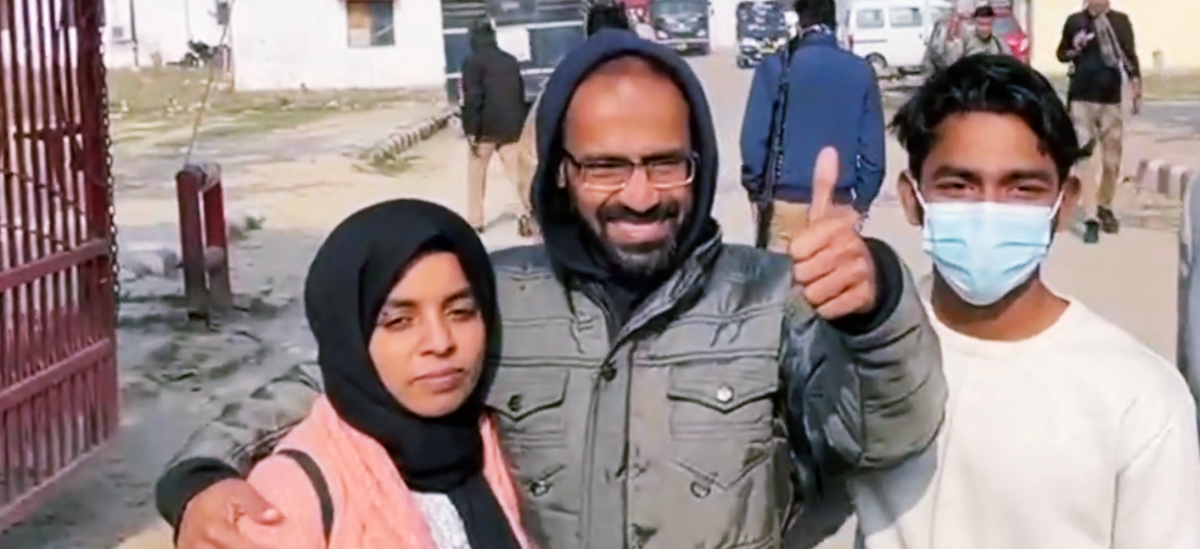Upon his release from jail on Thursday morning after 850 days in custody for attempting to do his job, journalist Siddique Kappan said, “I will continue my fight against draconian laws. They kept me in jail even after I got bail. I do not know who is benefiting from my being in jail. These two years were very tough, but I was never afraid.”
Kappan, a Malayalam language journalist, was arrested in October 2020 while he was on his way to report about the Hathras gang rape case in Uttar Pradesh.
For a working journalist or media professional to say that he will continue the “fight against draconian laws”, many would argue is akin to entering into the field of activism and violating the ‘basics’ of journalism – because as journalists, we are supposed to report and not campaign for or against anything. That is true. In an ideal world, there should be a clear demarcation between journalism and activism. However, in a situation where an act of journalism becomes crime, it becomes imperative for those associated with journalism to enter the world of activism.
To appreciate and understand why Kappan’s pledge to fight against draconian laws is important and demands our urgent attention and collective action, we need to have a quick look at the cases of journalists imprisoned in different parts of the country.
As per the Prison Census published by the Committee to Protect Journalists (CPJ), as on December 1, 2022, seven journalists were imprisoned in India. Most strikingly, six out of seven journalists are charged under the Unlawful Activities Prevention Act (UAPA), an anti-terror law that is instead regularly used to stifle dissent of activists and criminalise public interest journalism.
Now, Kappan and another journalist Mohammad Manan Dar, have been released. Another one, Gautam Navlakha, was put under house arrest. There are at least four journalists still languishing in jail and one of them, Aasif Sultan, has spent nearly four-and-half years in Jail. One journalist has been in jail for just over a year, while another will complete one year of imprisonment on Saturday (February 4). The fourth one has been in jail since July last year.
The detention of journalists for such extended periods is possible only because of draconian laws like UAPA, National Security Act (NSA), sedition and the Public Safety Act (PSA). And over the years, Indian authorities have arrested and charged dozens of journalists under draconian laws. Once charged under these laws, it becomes very difficult to avail bail while the trial stretches on for years.
Take the case of photojournalist Manan Dar. It took him more than a year to secure bail. That too in a matter where there was hardly any evidence against him. Notably, while granting him bail, the court that ruled that the NIA’s evidence against Dar is “not sufficient” to prove that he was part of the conspiracy “to undertake violent terrorist activities in the State of Jammu & Kashmir and other parts of India including Delhi after abrogation of Article 370 from the Constitution of India”. In its chargesheet, the NIA had alleged that Dar was working “under the cover of a photojournalist” to “share details” about security forces and their deployment in Kashmir with terrorist outfits.

Mohammad Manan Dar after his release. Photo: Special arrangement
Kappan’s own case is a telling example of the fact that journalism is being criminalised. Ater a wait of nearly two years, he was granted bail by the Supreme Court of India on September 9, 2022, stating that “every citizen has the right to free expression”. However, he remained in jail in another case, which was slapped against him by the Enforcement Directorate in 2021. He got bail in this case in late December 2022 but was only released on February 2.
In September 2020, Imphal-based journalist Kishorechandra Wangkhem was arrested by the Manipur Police on charges of sedition for the second time. Earlier, he was arrested in November under the NSA for criticising the Prime Minister Narendra Modi, state chief minister N. Biren Singh and the RSS in a YouTube video that went viral on social media. The Manipur high court in April 2019 quashed the charges against the journalist and released him from jail. One can cite dozens of cases against journalists, which clearly indicate that the state authorities are using these laws to criminalise journalists and media persons.
One visible impact of these cases against the journalists is that due to their criminalisation, they have to spend time in jail and lose their jobs. Even if the journalist charged is lucky enough not to be arrested, they end up spending substantial time, money and energy in the courts and litigation, which also distracts them from their job. However, another impact, perhaps the biggest one, is of the chilling effect this has on other journalists. This ultimately and directly affects the quality of journalism. In other words, when speaking truth to power becomes an act of crime, a large number of journalists turn into stenographers.
It is in this context that Kappan’s pledge to fight against draconian laws becomes crucial for journalism and press freedom in India. Hence, it becomes imperative on us not just to understand the pledge taken by brave journalists like Kappan but to join them in this fight to preserve our right to practice free and fearless journalism. If we fail to do so, we will not just be failing our fellow journalists who are languishing in jail on trumped-up charges but the very profession of journalism.
This article was first published on The Wire.

